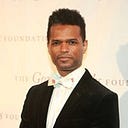Member-only story
How Kendrick Lamar Became His Generation’s Marvin Gaye
The two music legends mastered concept albums centered on freedom, equality, and Blackness
Below is an excerpt from veteran journalist and culture critic Miles Marshall Lewis’ upcoming book, Promise That You Will Sing About Me: The Power and Poetry of Kendrick Lamar, set for publication by St. Martin’s Publishing Group on September 28, 2021.
There’s not much consensus over what constitutes a concept album. A simple Facebook hivemind request — “What’s your favorite concept album by a Black artist?” — yielded everything imaginable.
Many mentioned Stevie Wonder’s Journey Through the Secret Life of Plants, Millie Jackson’s Caught Up, Beyoncé’s Lemonade, Janet Jackson’s Rhythm Nation 1814, Jay-Z’s 4:44, and Tyler, the Creator’s Igor. Jazz albums without any lyrics at all made a few followers’ lists: Miles Davis’s Bitches Brew, Journey Into Satchidananda by Alice Coltrane, A Love Supreme by John Coltrane. Critic Ann Powers mentioned Duke Ellington’s A Drum Is a Woman. Professor Michael Eric Dyson listed Curtis Mayfield’s Superfly, OutKast’s Speakerboxxx/The Love Below, and Maxwell’s Urban Hang Suite. Novelist Marlon James said De La Soul Is Dead, Janelle Monáe’s The ArchAndroid, and Black Music by Chocolate Genius. Other records came up that don’t…

